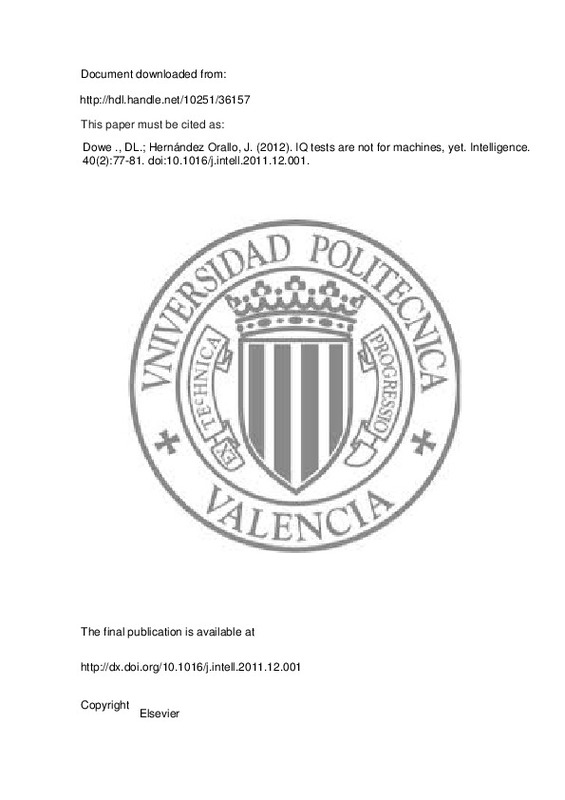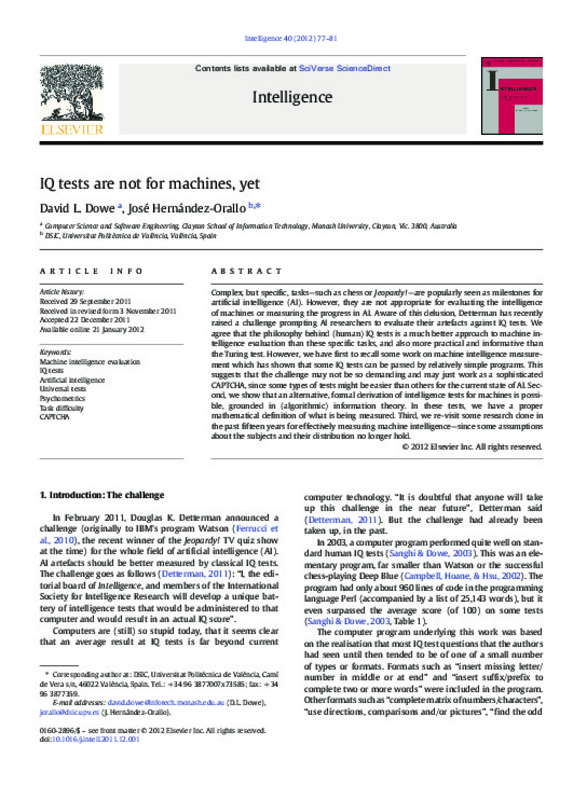JavaScript is disabled for your browser. Some features of this site may not work without it.
Buscar en RiuNet
Listar
Mi cuenta
Estadísticas
Ayuda RiuNet
Admin. UPV
IQ tests are not for machines, yet
Mostrar el registro sencillo del ítem
Ficheros en el ítem
| dc.contributor.author | Dowe, David L.
|
es_ES |
| dc.contributor.author | Hernández Orallo, José
|
es_ES |
| dc.date.accessioned | 2014-03-04T13:29:57Z | |
| dc.date.issued | 2012-04 | |
| dc.identifier.issn | 0160-2896 | |
| dc.identifier.uri | http://hdl.handle.net/10251/36157 | |
| dc.description.abstract | [EN] Complex, but specific, tasks¿such as chess or Jeopardy!¿are popularly seen as milestones for artificial intelligence (AI). However, they are not appropriate for evaluating the intelligence of machines or measuring the progress in AI. Aware of this delusion, Detterman has recently raised a challenge prompting AI researchers to evaluate their artefacts against IQ tests. We agree that the philosophy behind (human) IQ tests is a much better approach to machine intelligence evaluation than these specific tasks, and also more practical and informative than the Turing test. However, we have first to recall some work on machine intelligence measurement which has shown that some IQ tests can be passed by relatively simple programs. This suggests that the challenge may not be so demanding and may just work as a sophisticated CAPTCHA, since some types of tests might be easier than others for the current state of AI. Second, we show that an alternative, formal derivation of intelligence tests for machines is possible, grounded in (algorithmic) information theory. In these tests, we have a proper mathematical definition of what is being measured. Third, we re-visit some research done in the past fifteen years for effectively measuring machine intelligence¿since some assumptions about the subjects and their distribution no longer hold. | es_ES |
| dc.description.sponsorship | This work was supported by the MEC projects EXPLORAINGENIO TIN 2009-06078-E, CONSOLIDER-INGENIO 26706 and TIN 2010-21062-C02-02, and GVA project PROMETEO/2008/051. | |
| dc.format.extent | 5 | es_ES |
| dc.language | Inglés | es_ES |
| dc.publisher | Elsevier | es_ES |
| dc.relation.ispartof | Intelligence | es_ES |
| dc.rights | Reserva de todos los derechos | es_ES |
| dc.subject | Machine intelligence evaluation | es_ES |
| dc.subject | IQ tests | es_ES |
| dc.subject | Artificial intelligence | es_ES |
| dc.subject | Universal tests | es_ES |
| dc.subject | Psychometrics | es_ES |
| dc.subject | Task difficulty | es_ES |
| dc.subject | CAPTCHA | es_ES |
| dc.subject.classification | LENGUAJES Y SISTEMAS INFORMATICOS | es_ES |
| dc.title | IQ tests are not for machines, yet | es_ES |
| dc.type | Artículo | es_ES |
| dc.embargo.lift | 10000-01-01 | |
| dc.embargo.terms | forever | es_ES |
| dc.identifier.doi | 10.1016/j.intell.2011.12.001 | |
| dc.relation.projectID | info:eu-repo/grantAgreement/MICINN//TIN2009-06078-E/ES/ANYTIME UNIVERSAL INTELLIGENCE/ | es_ES |
| dc.relation.projectID | info:eu-repo/grantAgreement/MICINN//TIN2010-21062-C02-02/ES/SWEETLOGICS-UPV/ | es_ES |
| dc.relation.projectID | info:eu-repo/grantAgreement/GVA//PROMETEO08%2F2008%2F051/ES/Advances on Agreement Technologies for Computational Entities (atforce)/ | es_ES |
| dc.rights.accessRights | Abierto | es_ES |
| dc.contributor.affiliation | Universitat Politècnica de València. Departamento de Sistemas Informáticos y Computación - Departament de Sistemes Informàtics i Computació | es_ES |
| dc.description.bibliographicCitation | Dowe, DL.; Hernández Orallo, J. (2012). IQ tests are not for machines, yet. Intelligence. 40(2):77-81. https://doi.org/10.1016/j.intell.2011.12.001 | es_ES |
| dc.description.accrualMethod | S | es_ES |
| dc.relation.publisherversion | http://dx.doi.org/10.1016/j.intell.2011.12.001 | es_ES |
| dc.description.upvformatpinicio | 77 | es_ES |
| dc.description.upvformatpfin | 81 | es_ES |
| dc.type.version | info:eu-repo/semantics/publishedVersion | es_ES |
| dc.description.volume | 40 | es_ES |
| dc.description.issue | 2 | es_ES |
| dc.relation.senia | 238085 | |
| dc.contributor.funder | Generalitat Valenciana | es_ES |
| dc.contributor.funder | Ministerio de Ciencia e Innovación | es_ES |









